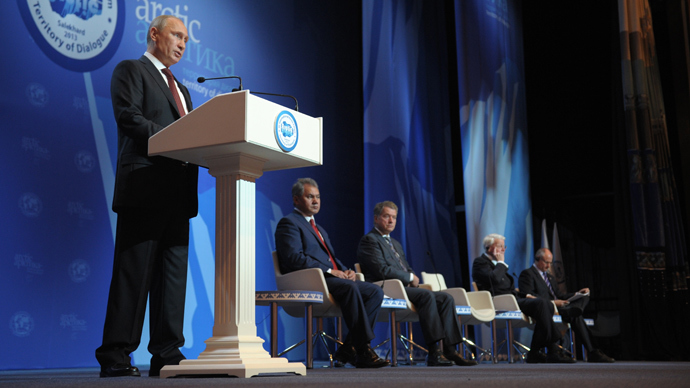
Putin’s Machine of Repression Destroying the Legitimacy of His Regime
Publication: Eurasia Daily Monitor Volume: 10 Issue: 173
By:

Each time President Vladimir Putin seeks to assert the restoration of political stability in Russia and capture some moral high ground, an embarrassing case of blatant repression comes up to undermine his claim. His orchestrated moment of political triumph at the meeting of the Valdai Club was compromised by the awkward questions about the persecution of protesters arrested on the eve of his presidential inauguration in May 2012 (https://grani.ru/opinion/milshtein/m.219210.html). Later, his ecology-focused address to the Arctic Forum in Salekhard last week (September 25) was spoiled by the scandal caused by the Greenpeace activists who had staged an action against Gazprom’s Prirazlomnaya oil platform in the Pechora Sea (Kommersant, September 26). The systemic execution of injustice in police raids, in investigations by the prosecution, or in courts is so deliberate and demonstrative that the legitimacy of Putin’s rigidly centralized and deeply corrupt regime inevitably declines even if Russian public opinion remains wary of change (https://www.levada.ru/27-09-2013/rossiyane-o-vladimire-putine).
The news-stream on the abuse of police power sharply increased this past week with the September 23 publication of a letter by Nadezhda Tolokonnikova, one of the jailed members of the Pussy Riot rock band, who started a hunger strike to protest the mistreatment of inmates in the Mordovian labor camp, where she is being held (https://lenta.ru/articles/2013/09/23/tolokonnikova/). Her letter revealed the practice of maintaining inhumane conditions in prisons for the exploitation of female convicts as slave labor (Moskovsky Komsomolets, September 24; Novaya Gazeta, September 27). It also asserted that one of the key pillars of Putin’s quasi-democratic regime is a system of breaking human dignity that closely resembles Joseph Stalin’s notorious GULAG prison labor camps (https://www.gazeta.ru/comments/column/novoprudsky/5671477.shtml).
Mikhail Khodorkovsky has learned the hard way all the banality of evil in this system and is standing tall against it is. The imprisoned former Yukos chief sent a letter of support to Tolokonnikova (https://khodorkovsky.ru/mbk/statements/2013/09/27/18342.html). Khodorkovsky’s long prison sentence has secured him high moral authority among the Russian opposition, and his role in the strengthening of civil society was recognized by the Lech Walesa award, which was noted even by the official media (https://ria.ru/world/20130926/966057051.html). A serious problem for Putin is the fast-approaching moment when Khodorkovsky’s sentence expires next summer unless a new case against him is built in great haste.
What stands in the authorities’ way is not the pending examination of the second case against Khodorkovsky in the European Court of Justice (this Court was highly critical of the procedural violations in the first case). Rather, the Russian government is increasingly concerned about the possible impact a new case against him might have on the investment climate (https://slon.ru/russia/pochemu_verkhovnyy_sud_ne_ispugalsya_khodorkovskogo_-975052.xhtml).
Meanwhile, on September 28, Prime Minister Dmitry Medvedev admitted at the Sochi International Investment Forum that Russia’s economic policy based on expanded state expenditures and “mega-projects” could not alter the trend of stagnation and that a reduction of state control over the economy was necessary (Kommersant, September 28). His analysis would hardly convince the investors that the government is serious about protecting their rights against the predatory attacks from Putin’s security services (siloviki). Russian business has been disappointed with the fiasco of Medvedev’s economic “modernization” efforts, and capital flight continues to plague the country (Vedomosti, September 27).
Entrepreneurs know too well that the situation where no business is safe cannot be changed by Medvedev’s promises of economic freedom. And in much the same way, Russian non-governmental organizations (NGO) are not fooled by the government’s offers to increase state funding to them—while legally, receiving any international grant could brand Russian NGOs as “foreign agents” (https://www.gazeta.ru/politics/2013/09/25_a_5669349.shtml). The opponents of, and the doubters in Putinism watch with keen interest the proceedings in the criminal trial of Alexei Navalny, who was found guilty in a crudely fabricated fraud case but unexpectedly set free after only a few hours in jail pending the decision of the appeals court (https://slon.ru/russia/intervyu_navalnogo-992683.xhtml). In the Moscow mayoral elections, Navalny gained far greater support than the Kremlin had estimated, which guarantees an explosion of protests if the verdict is confirmed (see EDM, September 9), but could confirm the impression of confusion in the ruling clique. Navalny, in the meantime, has not stopped re-assessing his new position as the leader of the irreconcilable opposition and keeps pounding away at the outrageous corruption in Putin’s “inner circle” (https://navalny.livejournal.com/863203.html).
On top of this expanding assemblage of controversial court cases, the harsh measures against the Greenpeace activists, who protested against the risky oil project in the Arctic and were captured by border troops under the pretext of “piracy,” have added to the building public outrage (https://lenta.ru/articles/2013/09/27/arktik/). Putin tried to discharge the conflict clarifying that the ecologists were not “pirates” but had to answer for violating the law. Yet, the court in Murmansk still treated them with extreme prejudice (Nezavisimaya Gazeta, September 26). Concerns about the environment may be not be that grave for the majority of Russians (even if the Prirazlomnaya platform is indeed critically unsafe), but the arrest of Denis Sinyakov, the photographer, who was merely taking pictures of the “sea battle,” has irked the community of journalists, while the heavy international resonance the case is creating is the last thing Putin wants (Novaya Gazeta, September 28). The incident brings into focus the profound discord in Moscow’s Arctic policy, which declares a commitment to international cooperation but is executed through the traditional projection of force in order to assert Russia’s sovereignty over the continental shelf and trade routes.
The primacy of force is indeed the crucial premise in Putin’s execution of state control over Russian society, and that is why he finds it so difficult to restrain the over-zealous and, in most cases, self-serving henchmen and prosecutors. He may want to “domesticate” the opposition and encourage entrepreneurs but is afraid that leniency may be interpreted as weakness, particularly because unrestrained corruption indeed corrodes and weakens the structures of a police state. Therefore, law enforcers at every level of the pyramid of power feel free to abuse the law as they see fit. And this escalating lawlessness becomes as unacceptable for the many stake-holders in Putin’s regime as it is for legally robbed businessmen or unceremoniously arrested protesters. The defiance of Tolokonnikova, Khodorkovsky, Navalny and Sinyakov hits deep at the foundation of the paternalist political order based on conformism, obedience and passivity. They maintain that there is nothing natural about the injustice upheld by a confused “decider,” who tries to project omnipotence but finds that his every decision cuts shorter the life expectancy of his “kleptocracy with a human face.”




